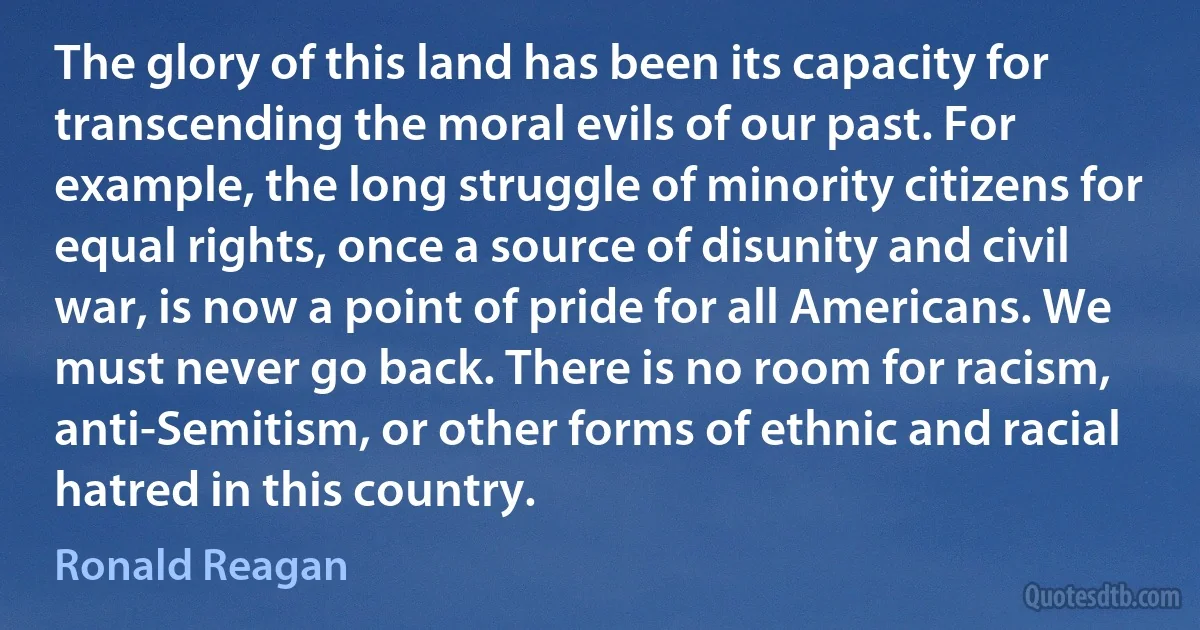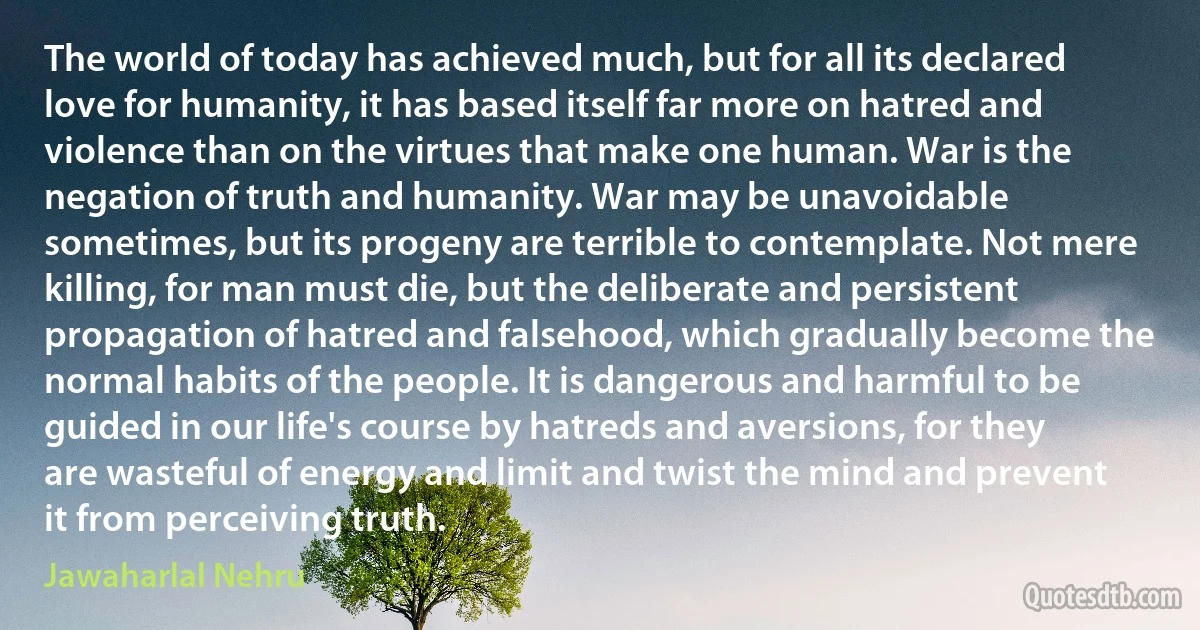Hatred Quotes - page 40
When you are insulted by someone or humiliated, guard against angry thoughts, lest they arouse a feeling of irritation, and so cut you off from love and place you in the realm of hatred. You should know that you have been greatly benefited when you have suffered deeply because of some insult or indignity; for by means of the indignity self-esteem has been driven out of you.

Maximus the Confessor
When you lie, you lie to God; when you steal, you steal from God; when you have hatred for someone, you have hatred for God; when you don't honor your parents, you don't honor God; when you are jealous, you are jealous of God; when you begrudge alms to the poor, you begrudge recompense to God; when you plot evil, you plot it against God; when you work evil, you work evil against God.

Nikolaj Velimirovic
The Devil endeavours by every means to keep men in error, in the enticement of the passions, in darkness of mind and heart; in pride, avarice, covetousness, envy, hatred, wicked impatience and irritation; in evil despondence, in the abominations of fornication, adultery, theft, false-witness, blasphemy, negligence, slothfulness, and sluggishness.

John of Kronstadt
A passion is a contranatural movement of the soul or an irrational love, or an blindfold hatred toward any material thing, or because of it: for example, for food, or for women, or for riches, or for worldly glory, or any other sensible thing; or for the sake of such things, as in a senseless hatred for someone on account of the things mentioned above.

Maximus the Confessor
"Hate the sin and not the sinner" is a precept which, though easy enough to understand, is rarely practiced, and that is why the poison of hatred spreads in the world... Man and his deed are two distinct things. It is quite proper to resist and attack a system, but to resist and attack its author is tantamount to resisting and attacking one-self. For we are all tarred with the same brush and are children of one and the same Creator, and as such the divine powers within us are infinite. To slight a single human being is to slight those divine powers, and thus to harm not only that being, but with him, the whole world.

Mahatma Gandhi
We weaken our greatness when we confuse our patriotism with tribal rivalries that have sown resentment and hatred and violence in all the corners of the globe. We weaken it when we hide behind walls, rather than tear them down, when we doubt the power of our ideals, rather than trust them to be the great force for change they have always been.

John McCain
[Russia is] a country which has many points of contact with ours and which has launched one of the mightiest experiments in history. All the world is watching her, some with fear and hatred, and others with passionate hope and longing to follow in her path." Then identifying himself with the second group, he theorises. "Much depends on the prejudices and preconceived notions which he brings to his task. But whichever view may be right, no one can deny the fascination of this strange Eurasian country of the hammer and sickle, where workers and peasants sit on the thrones of the mighty and upset the best-laid schemes of mice and men.

Jawaharlal Nehru
What the Buddhists teach is to free yourself from the three great evils in life: greed - which means all kinds of craving - hatred, and delusion. But delusion is really the cause of the other two. We crave that which we delude ourselves into thinking will bring happiness; we hate those whom we delude ourselves into thinking stand to stop us from getting it.

James P. Hogan
The 20th century was perhaps the deadliest in human history, devastated by innumerable conflicts, untold suffering, and unimaginable crimes.Time after time, a group or a nation inflicted extreme violence on another, often driven by irrational hatred and suspicion, or unbounded arrogance and thirst for power and resources. In response to these cataclysms, the leaders of the world came together at mid-century to unite the nations as never before.
A forum was created - the United Nations - where all nations could join forces to affirm the dignity and worth of every person, and to secure peace and development for all peoples. Here States could unite to strengthen the rule of law, recognize and address the needs of the poor, restrain man's brutality and greed, conserve the resources and beauty of nature, sustain the equal rights of men and women, and provide for the safety of future generations.

Kofi Annan
The acceptance of the principle of international cooperation is of immense importance for all states. Even the states which are most tempted to believe that they can stand by themselves have very much to gain by such cooperation. And for the smaller states - the weaker states - it is vital to all their hopes of liberty and justice.
It is necessary, when we say all this, to remind ourselves that the difference between uncontrolled nationalism and international cooperation does not necessarily depend on the form of government prevailing in the different states. It depends on the spirit in which those governments operate. There have been autocracies which have shown themselves liberal and just, even to other countries. There have been democracies which have been inspired, apparently, by feelings of bitter hatred for all foreigners.

Robert Cecil, 1st Viscount Cecil of Chelwood
Arrogance attracts hatred and envy. Elegance arouses respect and Love. Arrogance causes us to humiliate our fellow man or woman. Elegance teaches us to walk in the light. Arrogance complicates words, because it believes that intelligence is only for the chosen few. Elegance transforms complex thoughts into something that everyone can understand.

Paulo Coelho
After long generations of trouble, persecution and hatred, England had at last won through to a period of domestic peace and individual freedom. It was not a period of avowed idealism; it was not a period of legislative reform. But neither idealism nor reform is the whole of life for men or nations. The vigour and initiative of Englishmen, at home and overseas, in all branches of human effort and intellect, were the admiration of Eighteenth Century Europe. The greatness of England in the Hanoverian epoch was made by men acting freely in a free community, with little help indeed from Church or State, but with no hindrance. The great art of letting your neighbour alone, even if he thinks differently from you, was learnt by Englishmen under Walpole, at a time when the lesson was still a strange one elsewhere. Some European countries have not learnt it to this day or are rapidly unlearning it again.

G. M. Trevelyan
Throughout the civilised world the teachings of Marx evoke the utmost hostility and hatred of all bourgeois science (both official and liberal), which regards Marxism as a kind of "pernicious sect”. And no other attitude is to be expected, for there can be no "impartial” social science in a society based on class struggle. In one way or another, all official and liberal science defends wage-slavery, whereas Marxism has declared relentless war on that slavery. To expect science to be impartial in a wage-slave society is as foolishly naïve as to expect impartiality from manufacturers on the question of whether workers' wages ought not to be increased by decreasing the profits of capital.

Vladimir Lenin
Sanctity of life. You believe in it? Personally, I think it's a bunch of shit. Well, I mean, life is sacred? Who said so? God? Hey, if you read history, you realise that God is one of the leading causes of death. Has been for thousands of years. Hindus, Muslims, Jews, Christians all taking turns killing each other 'cuz God told them it was a good idea. Millions of dead motherfuckers all because they gave the wrong answer to the God question. «You believe in God?» «No.» Pfoom. Dead. «You believe in God?» «Yes.» «You believe in my God?» «No.» Pfoom. Dead. «My God has a bigger dick than your God!» Thousands of years. Thousands of years, and all the best wars, too. The bloodiest, most brutal wars fought, all based on religious hatred. Which is fine with me. Hey, any time a bunch of holy people want to kill each other I'm a happy guy.

George Carlin
Another serious charge against Jesus was that of treason to his country. His admonition to refrain from hatred and retaliation and instead to love the Romans seemed to the patriots of the day nothing less than disloyalty and treachery to his native land... There is little doubt as to what would have happened to an American citizen early in 1918 if he had arisen in a Liberty Loan mass meeting and pleaded for the immediate cessation of hostilities and protested against the hatred being manifested toward the Germans.

Kirby Page
There was a civil war in this country... Kennedy provoked such hostility and hatred. His death was cheered in the South because of his support for Martin Luther King. He was moving to change things on all fronts. He was starting to end the Cold War. He made a deal with Khruschev and Russia in 1962 to end the missile crisis, and he furthered the... Nuclear Test Ban Treaty in 1963. He... described the Soviets for the first time in American history as mortals, like us, who care about their children. He seemed to have an expanding vision of the world, much like Gorbachev did in Russia in the '80s... Since that day, the media has chanted the mantra that Oswald did it alone. But the American public... has never accepted it. They smell a rat.

Oliver Stone
If, from the idea of motherland, you take away covetousness, hatred, envy and vainglory; if you take away from it the desire for predominance by violence, what is there left of it?
It is not an individual unity of laws; for just laws have no colors. It is not a solidarity of interests, for there are no material national interests - or they are not honest. It is not a unity of race; for the map of the countries is not the map of the races. What is there left?
There is left a restricted communion, deep and delightful; the affectionate and affecting attraction in the charm of a language - there is hardly more in the universe besides its languages which are foreigners - there is left a personal and delicate preference for certain forms of landscape, of monuments, of talent. And even this radiance has its limits. The cult of the masterpieces of art and thought is the only impulse of the soul which, by general consent, has always soared above patriotic littlenesses.

Henri Barbusse
You know, the dirty little secret is no longer sex; the dirty little secret is hatred and rage. It's the tirade that's taboo. Odd that this should be so a hundred years after Dostoyevsky (and fifty after Freud), but nobody nice likes to be identified with the stuff. It's the way folks used to feel about fellatio in the good old days. "Me? Never heard of it. Disgusting." But is it "hostile," really, to take a look at the ferocity of the emotion they call "hostility"?

Philip Roth



